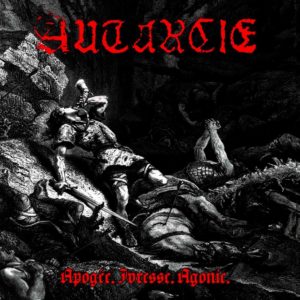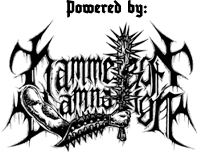 Since 2006, AUTARCIE have stood as a proud firmament of French black metal rooted in ancient times. The duo have delivered six full-lengths to date, always with a vitality that’s grounded in tradition but burning with an unquenchable intensity that’s very much of the present. Of course, nostalgic is their vision and thus their lyricism largely focuses on the past, but the crux of AUTARCIE‘s vision is about preserving those past expressions and carrying them on for future generations – in effect, black metal as modern-era folklore – and rigorously portraying them in dazzling obsidian hues which fondly recall the Concilium collective whilst dramatically daubing them in a melodicism that’s medieval as it is melancholic.
Since 2006, AUTARCIE have stood as a proud firmament of French black metal rooted in ancient times. The duo have delivered six full-lengths to date, always with a vitality that’s grounded in tradition but burning with an unquenchable intensity that’s very much of the present. Of course, nostalgic is their vision and thus their lyricism largely focuses on the past, but the crux of AUTARCIE‘s vision is about preserving those past expressions and carrying them on for future generations – in effect, black metal as modern-era folklore – and rigorously portraying them in dazzling obsidian hues which fondly recall the Concilium collective whilst dramatically daubing them in a melodicism that’s medieval as it is melancholic.
One need look no further than Apogée.Ivresse.Agonie to witness the apotheosis of AUTARCIE‘s uniquely idiosyncratic vision. Uncompromising as ever, the duo’s seventh opus summons echoes from the past – hypnogogically so, so comfortingly familiar this approach initially feels – and digs its trench deeper into old Gaelic territory. The soundfield is paradoxically warm, perhaps burning with hatred rather than freezing from ice running through those same veins, but is emblematic of AUTARCIE‘s quest for the rural, the pre-Industrial, even something approaching the pastoral. Likewise, tempos are brisk but never bustling with extreme speed; patient is their gait, and patience rewards those who reject garish modernity. So it is with AUTARCIE here on Apogée.Ivresse.Agonie, and their justifiably front-and-center melodicism bares even greater poignancy than ever, every note bleeding both triumph and tragedy, bloodlust and bittersweetness. Suitably, this work is generous in its length at an immersive 56 minutes, veritably its own landscape of the imagination, its own forgotten realm. AUTARCIE rule over all, overall.
With its members envolved in projects such as Ciel Nocturne, SvartKrig, Caterva Runa and Scythe, the duo brings the most brutal French underground to this incredible album. Well, what do you know … Autarcie may have a better, more polished sound with more atmosphere and samples of mediaeval battle noises but Nokturn’s singing is still gruff and gravelly and he still has an ear for often catchy melodies and riffs. The production on the album may be better and clearer than it was on early recordings but it’s still dark and gives the music a raw feel.
The music often has great, almost epic drama but its style is very streamlined and minimalist, limited to guitars, bass, percussion, synthesisers (on some tracks) and samples. The pace of the music varies but is usually fast, the tremolo guitars whirring away like a mass of hornets and the drumming sticking to its time-keeper duties; the result is music that may not be flamboyant and highly individualistic but instead is focused and energetic as a vehicle for Nokturn’s lyrics which among other things revolve around the history of the Sequani, a Celtic tribe that lived in the area of Bourgogne-Franche-Comté (Autarcie’s home country) during Roman imperial rule.
As the album progresses, the drumming starts to show more individual flair with plenty of cymbal and hi-hat work, and the music opens up with bursts of folk melodies on clean-toned guitar (middle track “Regnorum Francorum” being prominent in this respect). The singing seems more intense, raspy and even bloodcurdling at times. The mood becomes less subdued and melancholy and strong nostalgia are very noticeable on songs which also include more folk influences. The songs become longer, culminating in the title track that almost hits 11 minutes in length, featuring as it does memorable tremolo guitar riffs that thrum with defiant energy, a flash of scourging lead guitar, rock-out grooves and lively drumming with plenty of cymbal work. The emotion, love and the connection the Autarcie musicians have with the history of their region, and their desire to communicate what they believe in, are strong and these feelings drive instrumental music that sometimes threatens to upstage Nokturn’s lyrics in this final song on the album.
One could argue that French black metal has been dead forever: ravens pick at the corpses of the Black Legions still, those dried-up sinews not fit for consumption no matter how many generations removed, and urban decay has covered much of the prevailing paradigm for nearly two decades, incorrectly assumed to be a uniting (and uniquely) French expression. One would be right, too. AUTARCIE return at the right time, not so much shouldering this burden as carrying a spiritual weight that’s solely concerned with naturalism and its myriad portrayals thereof. Romantic is this path, in the purest definition of the word, and Apogée.Ivresse.Agonie is the brilliant canvas.
Rate: 666















